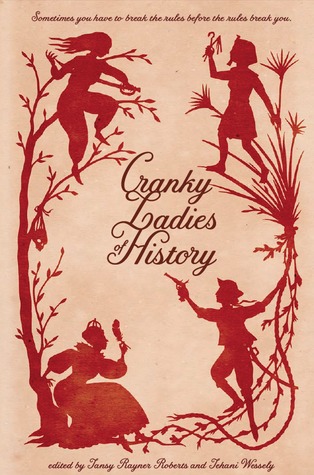
A. V. Mather
A. V. Mather is a Brisbane-based speculative fiction writer. You can follow her on Twitter @AVMather
Cranky Ladies of History
 This anthology shines a spotlight on some of the famous, infamous and, more often, overlooked women of history and legend. According to editors, Tansy Raynor Roberts and Tehani Wessely, inclusion has been reserved for ‘women who bucked the trends of their time and took on cultural norms to challenge society’s rules and ideas about how women should behave.’
This anthology shines a spotlight on some of the famous, infamous and, more often, overlooked women of history and legend. According to editors, Tansy Raynor Roberts and Tehani Wessely, inclusion has been reserved for ‘women who bucked the trends of their time and took on cultural norms to challenge society’s rules and ideas about how women should behave.’
With that in mind, prepare yourself for a dazzling array of pirate queens, virgin-sacrificers and rabble-rousers, God-fearers and Fear-of-God-ers. This book fair takes you by the throat with 23 stories starring women of the Sword, of God and of Mysticism but – first and foremost – of themselves. The players are rich and varied, with many a dark horse featuring alongside well-knowns such as Ann Boleyn and Elizabeth I. Each of these stories is highly emotive: many laced through with dark symbolism, traces of magic, witchcraft and ‘women’s business.’
Some of the leading ladies are captured at a moment of self-discovery, which will turn them into the characters we have come to know. Others knew who they were from the very first breath. ‘Knowledge was power. And I wanted to be knowledgeable’, says Neferure, young daughter of the assassinated Pharoah in Amanda Pillar’s ‘Neter Nefer’. It could well be the credo of the whole anthology.
We don’t often credit the people of Ancient Egypt, Victorian England or colonial America with the political and social sensibilities that we employ and engage in today. I admire the ability of the authors to reach into the dry and dusty recordings of history and tease out the personal quirks and motivations that make identifiable human beings. Whether petty or grand, it’s these qualities that bring legendary figures to life. ‘Hallowed Ground’ by Juliet Marillier, ‘The Lioness’ by Laura Lam, and ‘Due Care and Attention’ by Sylvia Kelso stand as wonderful examples. The result is a collection of stories that are engaging, fascinating and, often, all too brief.
In the foreword, the editors also make mention of how these women are often buried in historical accounts, which certainly rings true. After reading the book, I realised that I felt instantly oriented in a story when an iconic male character was mentioned. A prime example is Henry the VIII himself. His wives and daughters are still often presented as possessions, picked up and discarded, despite each one’s role in influencing the shaping of a nation. They are celebrated here, in ‘Queenside’ by Liz Barr and ‘Glorious’ by Faith Mudge, with some beautiful insights into their perspectives of events.
It could be said that this is a book of outlaws, in the true sense of the word. These are complicated women, as vicious in battle as men, often more so, and with memories that run long. They are also caring and compassionate, stubborn, headstrong, brilliant, violent and spiteful. These stories raise questions that have been applied through history whenever women have acted outside social perception of ‘what is proper’.
Some give a definite sense of time and place, while others focus instead on the events at hand. They are not arranged in any particular order other than the book title itself. What you have here is a treasure chest in which you will find a very eclectic collection of sharp and glittering delights.
While some stories could be considered gentle and reflective, others deal with tales of betrayal, vengeance, insanity and greed. For these reasons, I suggest that this is not a book to be read in one sitting. They should be taken out, one by one, and admired under the light. Readers who prefer to engage with characters in short, sharp bursts should enjoy this aspect.
The contributing authors are as talented and diverse a group as you could expect to find in Speculative Fiction today. They are award winners and nominees, contributors to and editors of anthologies, and writers of poetry, blogs, podcasts, social and political commentary. The diversity and quality of thought is reflected in this timely education on a few of the remarkable women of history and legend. It makes you wonder why they have been ‘buried beneath the weight of years’, when countless male figures are borne up by it.


































